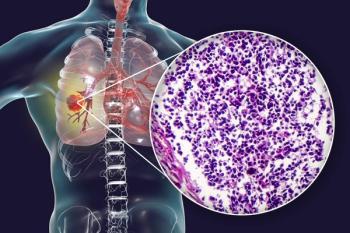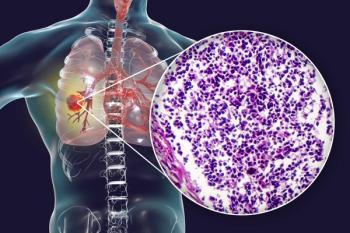
There is a clear need for further trials and drug development to mitigate poor outcomes in patients with small cell lung cancer, according to an expert from Yale School of Medicine.

Your AI-Trained Oncology Knowledge Connection!


There is a clear need for further trials and drug development to mitigate poor outcomes in patients with small cell lung cancer, according to an expert from Yale School of Medicine.

Factors including age, gender, and facility type may influence the likelihood of pain specialist referrals for lung cancer, suggesting a need for multidisciplinary pain management in this patient population.

Investigators indicate that strategies are necessary to identify patients with extensive-stage small cell lung cancer who won’t benefit from immunotherapy-based treatment.

A favorable Glasgow prognostic score appears to correlate with improved overall survival and progression-free survival following treatment with atezolizumab plus carboplatin and etoposide for small cell lung cancer.

Patients 70 years or older with limited stage small cell lung cancer appear to tolerate concurrent thoracic chemoradiotherapy and have similar disease control rates as younger patients.

Findings from the phase 1/2 CA001-030 study indicate that BMS-986012 in combination with nivolumab is well tolerated among patients with small cell lung cancer.

The FDA gave the dual epigenetic modulator JBI-802 an orphan drug designation to treat small cell lung cancer and acute myeloid leukemia.

Early results from the phase 1/2 LUPER study indicated that lurbinectedin in combination with pembrolizumab demonstrated no unexpected toxicities and promising preliminary efficacy in the second line for patients with relapsed small cell lung cancer, according to Antonio Calles, MD.

A recent study found that giving sinoatrial node radiation therapy during chemoradiotherapy may increase the likelihood of atrial fibrillation in patients with small cell lung cancer and non–small cell lung cancer.

Anne Chiang, MD, PhD, discussed results from a pilot study of biomarkers in tumors treated with ipilimumab and nivolumab in extensive-stage small cell lung cancer.

Charles M. Rudin, MD, PhD, discussed results of the phase 3 SKYSCRAPER-02 trial examining atezolizumab with carboplatin and etoposide with or without tiragolumab in untreated extensive-stage small cell lung cancer.

After approximately 3.5 years of follow-up, patients with treatment-naive extensive-stage small cell lung cancer continued to derive survival benefit from pembrolizumab and etoposide.

Data from the phase 2 UCLA/TRIO-US L-07 trial presented at 2022 WCLC revealed that efficacy with talazoparib plus temozolomide improves upon historical controls in patients with extensive-stage small cell lung cancer.

Response rates with temozolomide plus nivolumab in extensive-stage small cell lung cancer show promise.

Preliminary findings of data from the phase 1/2 LUPER study demonstrate that treatment with lurbinectedin combined with pembrolizumab elicits promising efficacy in patients with metastatic small-cell lung cancer that has failed to respond to chemotherapy.

The addition of tiragolumab to atezolizumab plus carboplatin and etoposide did not yield improved overall survival or progression-free survival rates in patients with extensive-stage small cell lung cancer.

The phase 3 JUPITER-08 trial assessed toripalimab plus chemotherapy, which was granted an orphan drug designation by the FDA, in patients with extensive-stage small cell lung cancer.

A phase 3 trial of patients with extensive-stage small cell lung cancer who were treated with adebrelimab plus chemotherapy compared with matched placebo met the primary end point of overall survival.

Those with inflamed T cell or YAP1–positive extensive-stage small cell lung cancer were likely to gain an improvement in overall survival following treatment with durvalumab and chemotherapy vs those with other overexpressed biomarkers.

Serplulimab, which has been granted orphan drug designation by the FDA, is being considered as a treatment for patients with small cell lung cancer.

Although tiragolumab plus atezolizumab and chemotherapy missed the primary end point of progression-free survival superiority in the phase 3 SKYSCRAPER-02 trial in patients with extensive-stage small cell lung cancer, it will continue to be evaluated in non–small cell lung cancer.

In the final part of the small cell lung cancer podcast series, CancerNetwork® and Wade Iams, MD, discuss the future of treating patients with this disease.

In episode 3 of a 4-part small cell lung cancer podcast series, Wade Iams, MD, highlights practical considerations for treating patients with small cell lung cancer, including managing toxicities and the impact of treatment on a patient’s quality of life.

Treatment with serplulimab yielded a significant improvement in overall survival in combination with chemotherapy in patients with previously untreated extensive-stage small cell lung cancer.

Compared with whole brain radiotherapy alone, the addition of local radiation boost to whole brain radiotherapy improved overall survival and progression-free survival among patients with small cell lung cancer and brain metastases.